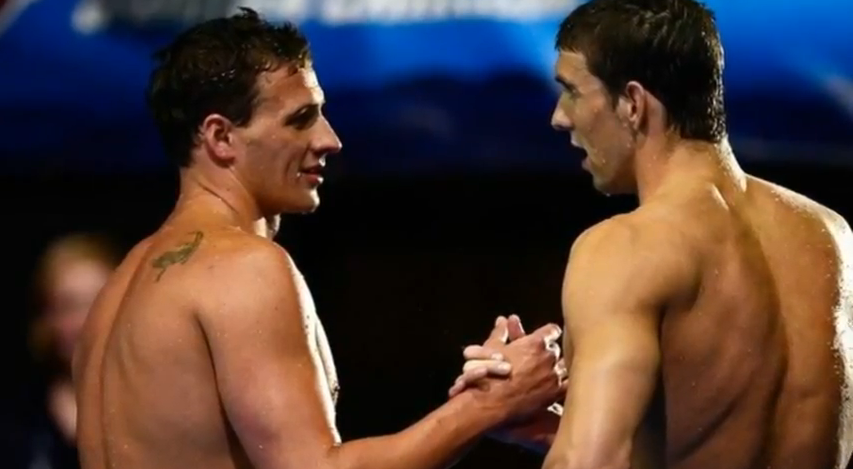Ryan Lochte vs. Michael Phelps: Why Rivalries Make Us Better

The celebrated rivalry between American swimmers Ryan Lochte and Michael Phelps will come to a head Saturday, when the 27-year-old U.S. teammates compete for Olympic gold in the 400-meter individual medley. Lochte beat Phelps by just 83-hundredths of second in the four-minute race at trials last month, and anything could happen at what's been dubbed the "duel in the pool" in London.
For years Lochte splashed around in the wake of Phelps, who won a record eight gold medals at the 2008 Olympics, but their rivalry has intensified as their finish times have converged. Lochte says this summer is his turn to shine, while Phelps wants one last hurrah. New research on rivalry suggests they're both the better athletes for their epic battle to be best.
"A rivalry in this kind of context is apt to benefit these swimmers' motivation and performance," said Gavin Kilduff, an assistant professor at New York University who studies the causes and consequences of rivalry. In fact, the swimmers could be boosting each other's performances by as much as 2 percent.
Intense rivalries develop for three main reasons, according to past research by Kilduff and colleagues. First, competitors turn into rivals when they feel similar to one another, both in terms of characteristics and abilities. Second, a rivalry builds the more times two competitors face off. It further strengthens when past contests have been closely decided.
"That could be in part because if you win or lose by a very small margin, you imagine that the opposite could have happened; that can be a very emotionally arousing situation that lives on in your mind," Kilduff told Life's Little Mysteries.
Hitting all the marks, the rivalry between Lochte and Phelps seems inevitable. Now, new, unpublished research by Kilduff and colleagues suggests it could be shaving as much as 2 percent off the swimmers' times. Looking at the performance of 82 amateur runners of 5-kilometer races over the course of six years, the researchers found that the runners ran, on average, 25 seconds faster when they competed against a runner who fit the profile of being their rival (based on the characteristics of rivals described above). Assuming experienced runners finish 5K races in 20 minutes, that's a 2-percent speed increase.
Although one cannot always reliably extrapolate that number to other sports or situations, Kilduff said the message is clear: "Rivalries produce a significant performance boost." [The 7 Biggest Mysteries of the Human Body]
Sign up for the Live Science daily newsletter now
Get the world’s most fascinating discoveries delivered straight to your inbox.
That holds true for everyone, not just elite athletes. In another finding to be published as part of the same study, Kilduff found that having a rival in school, the workplace, on a sports team, or in a romantic relationship motivates and energizes us. In one experiment, he asked one group of people to write a detailed essay about a personal rival of theirs, and another group to write an essay about a non-rival competitor. When he next asked the study participants to list as many uses of an object (such as a brick or knife) as they could come up with, those who had written about their rivals persisted in the task and thought up significantly more uses for the object before moving on to another question than did the other participants. "It energizes people to think about a rival of theirs," Kilduff explained.
The results indicate that competing against a rival boosts people's performance on any tasks that require brute force or effort. There's a dark side, however: Kilduff also found that people who are "primed with rivalry" more often cheat or lie when given the opportunity. This effect manifests itself, for example, in soccer. "Games between rival teams have a significantly higher frequency of yellow and red cards given out for unethical behavior," Kilduff said.
In short, when you have a rival, "you're going to put forth more effort," he said, "but you're also going to cut corners and just do whatever it takes to win."
Follow Natalie Wolchover on Twitter @nattyover or Life's Little Mysteries @llmysteries. We're also on Facebook & Google+.
Natalie Wolchover was a staff writer for Live Science from 2010 to 2012 and is currently a senior physics writer and editor for Quanta Magazine. She holds a bachelor's degree in physics from Tufts University and has studied physics at the University of California, Berkeley. Along with the staff of Quanta, Wolchover won the 2022 Pulitzer Prize for explanatory writing for her work on the building of the James Webb Space Telescope. Her work has also appeared in the The Best American Science and Nature Writing and The Best Writing on Mathematics, Nature, The New Yorker and Popular Science. She was the 2016 winner of the Evert Clark/Seth Payne Award, an annual prize for young science journalists, as well as the winner of the 2017 Science Communication Award for the American Institute of Physics.












